|
|
 |
 |

|
| Ackroyd, Peter - Trial of Elizabeth Cree
|
(Doubleday US 1995 HC/DJ 50:-)
Mixing history with liberal doses of invention, Ackroyd presents a dark, atmospheric portrait of Victorian London. While bringing in everyone from an elderly Karl Marx to a youthful George Gissing, he focuses on Elizabeth Cree, who is on trial for her husband's murder. Ackroyd uses the transcripts of Cree's trial to set the stage for a series of flashbacks tracing her squalid beginnings in Lambeth Marsh, her days in comedian Dan Leno's music hall troupe, and her eventual marriage to journalist John Cree. Set against this is a diary, purportedly by John, that details the murderous exploits of the "Limehouse Golem." In Elizabeth's pathology, Ackroyd finds a harbinger for the social malignancies of our own age. An intellectually stimulating, if grisly, historical thriller.
|
|

|
| Anonymous - Primare Colors
|
(Chatto & Windus UK 1996 HC/DJ 80:-)
The most talked-about political novel ever written, Primary Colors is the story of an ambitious, idealistic, womanizing young Southerner whirling his way to the White House. Here are the power plays, the media frenzy, and the pace and sheer craziness of a presidential campaign portrayed with more drama, humor, and insight than ever before. Now a major motion picture from Universal Pictures , this novel makes you wonder: Can a total political animal be America's best hope?
|
|

|
| Archer, Jeffrey - Fouth Estate
|
(Harper Collins UK 1996 HC/DJ 60:-)
Lubji Hoch survived World War II on luck, guts, and ruthlessness. At the war's end, renamed Richard Armstrong, he buys a floundering newspaper in Berlin and deviously puts his competitors out of business. But it isn't enough. Meanwhile, on the other side of the world, Keith Townsend, the Oxford-educated son of a millionaire newspaper owner, takes over his family's business. His energy and brilliant strategic thinking quickly make him the leading newspaper publisher in Australia. Still, he longs to move on to the world stage.
|
|
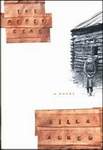
|
| Askew, Rilla - The Mercy Seat
|
(Viking US 1997 HC/DJ 80:-)
Eleven-year-old Mattie Lodi narrates most of this story about the utter destruction of her family, which begins in 1888 when her renegade uncle's criminal activities force the family to leave their native Kentucky for the wild, lawless Indian Territory. By the time they settle in Oklahoma, Mattie's mother and sister are dead, her brother is brain-damaged, and her father has withdrawn into impenetrable silence. Then a violent feud begins to stew between him and his brother. Mattie tries to hold her family together but eventually becomes the catalyst for the bloody climax to the feud.
|
|

|
| Bragg, Melvyn - Credo
|
(Sceptre UK 1996 HC/DJ 80:-)
"Credo" tells the story of a young Irish princess named Bega, and the two loves of her life - her God and a young nobleman called Padric - a lifelong tug between this earth and the next, romance and faith. The story is set in seventh century Britain, and Melvyn Bragg has really done his homework, describing life in Anglo Saxon times in rich detail. Many of the characters are based on historical figures too, St Bega being the main one, and the story hinges around real events. It's quite a fascinating period in English history, and an important one in the story of Christianity, and Credo hits a satisfying balance between love story, adventure, and historical exploration. These were savage times, and Bragg doesn't gloss over the brutality. He doesn't dwell on it either, but sensitive readers should be warned that there are some genuinely horrible moments. First Edition
|
|
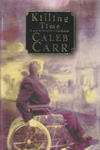
|
| Carr, Caleb - Killing Time
|
(Random House US 2000 HC/DJ 50:-)
Set about 25 years ahead, the first-person narrative describes the grim adventures of Gideon Wolfe, a bestselling author who joins forces with a band of outsiders intent on alerting the world to the dangers of excess information untempered by wisdom.
By 2023, the Internet has multiplied wildly the ability of power possessors to deceive the general populace, resulting in a globe devastated by ecological blight and filled with near-zombies glued to computer screens. Some groups have escaped this fate, particularly those living in unwired if disease-ravaged areas of Africa and Asia and a few, led by the enormously wealthy and brilliant brother-and-sister team of Malcolm and Larissa Tressalian, have vowed to fight it.
|
|
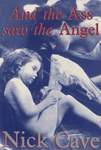
|
| Cave, Nick - And the Ass saw the Angel
|
(Black Spring UK 1898 HC/DJ 500:-)
Cave’s only novel to date takes on the southern gothic in this bizarre baroque tale. Born mute to a drunken mother and a demented father, tortured Euchrid Eucrow finds more compassion in the family mule than in his fellow men. But he alone will grasp the cruel fate of Cosey Mo, the beautiful young prostitute in the pink caravan on Hooper’s Hill. And it is Euchrid, spiraling ever deeper into his mad angelic vision, who will ultimately redeem both the town and its people.
|
|
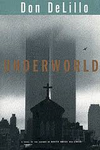
|
| DeLillo, Don - Underworld
|
(Scribner US 1997 HC/DJ 100:-)
While Eisenstein documented the forces of totalitarianism and Stalinism upon the faces of the Russian peoples, DeLillo offers a stunning, at times overwhelming, document of the twin forces of the cold war and American culture, compelling that "swerve from evenness" in which he finds events and people both wondrous and horrifying. Underworld opens with a breathlessly graceful prologue set during the final game of the Giants-Dodgers pennant race in 1951. Written in what DeLillo calls "super-omniscience" the sentences sweep from young Cotter Martin as he jumps the gate to the press box, soars over the radio waves, runs out to the diamond, slides in on a fast ball, pops into the stands where J. Edgar Hoover is sitting with a drunken Jackie Gleason and a splenetic Frank Sinatra, and learns of the Soviet Union's second detonation of a nuclear bomb. It's an absolutely thrilling literary moment. When Bobby Thomson hits Branca's pitch into the outstretched hand of Cotter--the "shot heard around the world"--and Jackie Gleason pukes on Sinatra's shoes, the events of the next few decades are set in motion, all threaded together by the baseball as it passes from hand to hand.
|
|
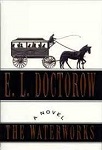
|
| Doctorow, E L - The Waterworks
|
(Random House US 1994 HC/DJ 80:-)
One rainy morning in 1871 in lower Manhattan, Martin Pemberton a freelance writer, sees in a passing stagecoach several elderly men, one of whom he recognizes as his supposedly dead and buried father. While trying to unravel the mystery, Pemberton disappears, sending McIlvaine, his employer, the editor of an evening paper, in pursuit of the truth behind his freelancer’s fate. Layer by layer, McIlvaine reveals a modern metropolis surging with primordial urges and sins, where the Tweed Ring operates the city for its own profit and a conspicuously self-satisfied nouveau-riche ignores the poverty and squalor that surrounds them.
In E. L. Doctorow’s skilled hands, The Waterworks becomes, in the words of The New York Times, “a dark moral tale . . . an eloquently troubling evocation of our past.”
|
|
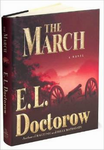
|
| Doctorow, E.L. - The March
|
(Random House US 2005 HC/DJ 80:-)
Sherman's march through Georgia and the Carolinas produced hundreds of thousands of deaths and untold collateral damage. In this powerful novel, Doctorow gets deep inside the pillage, cruelty and destruction—as well as the care and burgeoning love that sprung up in their wake. William Tecumseh Sherman ("Uncle Billy" to his troops) is depicted as a man of complex moods and varying abilities, whose need for glory sometimes obscures his military acumen. Most of the many characters are equally well-drawn and psychologically deep, but the two most engaging are Pearl, a plantation owner's despised daughter who is passing as a drummer boy, and Arly, a cocksure Reb soldier whose belief that God dictates the events in his life is combined with the cunning of a wily opportunist. Their lives provide irony, humor and strange coincidences. Though his lyrical prose sometimes shades into sentimentality when it strays from what people are feeling or saying, Doctorow's gift for getting into the heads of a remarkable variety of characters, famous or ordinary, make this a kind of grim Civil War Canterbury Tales. On reaching the novel's last pages, the reader feels wonder that this nation was ever able to heal after so brutal, and personal, a conflict.
|
|

|
| Drury, Allen - A Shade of Difference
|
(Doubleday US 1962 HC/DJ 60:-)
The sequel to the Pulitzer Prize winning bestseller ADVISE AND CONSENT. From Allen Drury, the 20th Century grand master of political fiction, a novel of the United Nations and the racial friction that could spark a worldwide powderkeg.
International tensions rise as ambassadors and politicians scheme, using the independence of a small African nation as the focal point for hidden agendas. A cascade of events begun in the General Assembly Hall of the United Nations could lead to the weakening of the United States, the loss of the Panama Canal, and a possible civil war.
Allen Drury paints a vivid and laseraccurate portrait of Washington and international politics, from top secret conferences, to elite cocktail parties, club luncheon rooms, and the private offices of the key players in government. A novel as relevant today as when it was first published.
|
|

|
| Frazier, Charles - Cold Mountain
|
(Atlantic Monthly US 1997 HC/DJ 80:-)
The hero of Charles Frazier's beautifully written and deeply-imagined first novel is Inman, a disillusioned Confederate soldier who has failed to die as expected after being seriously wounded in battle during the last days of the Civil War. Rather than waiting to be redeployed to the front, the soul-sick Inman deserts, and embarks on a dangerous and lonely odyssey through the devastated South, heading home to North Carolina, and seeking only to be reunited with his beloved, Ada, who has herself been struggling to maintain the family farm she inherited. Cold Mountain is an unforgettable addition to the literature of one of the most important and transformational periods in American history.
|
|

|
| Friedman, Kinky - The Christmas Pig
|
(Simon & Schuster US 2006 HC/DJ 50:-)
King Jonjo Mayo the First is in a bind. Every Christmas, he commissions an artist to paint a traditional nativity scene to be dramatically revealed after midnight mass. This year, though, the date is mere weeks away, and he still has not yet found his painter. The king decides to take a chance on a peculiar, mute boy whose artistic genius and clairvoyance are rumored throughout the kingdom. He sends three valiant, if begrudging, knights to seek out the boy in the remote countryside. Finally, they find Benjamin -- and he is, indeed, peculiar. Nobody knows if the child is up to the task, but the king's Christmas tradition -- and Benjamin himself -- might just be saved by a Christmas miracle that comes in the form of a very special pig -- who is rather peculiar herself.
|
|
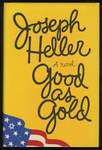
|
| Heller, Joseph - Good as Gold
|
(Simon & Schuster US 1979 HC/DJ 80:-)
Bruce Gold, a middle-aged, Jewish professor of English literature, finds himself on the brink of a golden career in politics -- and not a moment too soon, as Gold yearns for an opportunity to transform a less-than-picture-perfect life: His children think little of him, his intimidating father endlessly bullies him, and his wife is so oblivious that she doesn't even notice he's left her. As funny as it is sad, Good as Gold is a story of children grown up, parents grown old, and friends and lovers grown apart -- a story that is inimitably Heller.
|
|
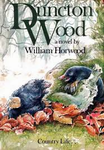
|
| Horwood, William - Duncton Wood
|
(Country Life UK 1980 HC/DJ 80:-)
"Duncton Wood" and the subsequent novels in the series revolve around the moles that inhabit the United Kingdom. The mole communities (referred to as "Moledom") are anthropomorphically portrayed as intelligent societies with their own social organization, history and written form of communication. The extent of animal personification is not unlike that of Richard Adams' Watership Down, to which Horwood's series is often favourably compared[citation needed], in that the moles are limited to the physical behaviours of their real-world burrow-dwelling counterparts, and neither wear clothing nor exhibit any special technological aptitude. The central focus of the Duncton series is the Stone, a fictitious mole religion based on the standing stones and stone circles of Britain. As such, the novels are predominantly set in and around locales known for their megaliths, such as Avebury and Rollright.
|
|
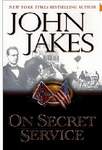
|
| Jakes, John - On Secret Service
|
(Dutton US 2000 HC/DJ 100:-)
John Jakes is to historical American fiction what Stephen King is to horror: a one-man industry. Jakes, the author of over 60 books, including the eight-part Kent Family Chronicles, the North and South Trilogy, and innumerable short stories of the American West, returns to his well-trod Civil War stomping grounds in the engrossing On Secret Service. The story of a war within a war on various levels--the North v. the South, the Union's Pinkerton Detective Agency v. the Confederacy's agent provocateurs, youthful idealism v. youthful lust--On Secret Service chronicles the lives and times of four young Americans, from the war's early tremors in January 1861, through its bloody conclusion, Lincoln's assassination, and John Wilkes Booth's murder in May 1865. First Edition
|
|
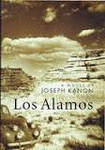
|
| Kanon, Joseph - Los Alamos
|
(Little Brown UK 1997 HC/DJ 50:-)
In the spring of 1945, as the war in Europe is coming to an end, a former police reporter turned Army Intelligence agent named Mike Connolly arrives on the high mesa above Santa Fe, New Mexico, where J. Robert Oppenheimer and a team of scientists are rushing to finish their atomic bomb. A security man has been found battered to death, and Connolly's job is to see if it is anything more than the sordid sex crime it appears to be. Using a devilishly clever mixture of real and fictional characters, Kanon spins out a story that manages to be audacious, persuasive--and totally engrossing.
|
|

|
| Kerr, Philip - Esau
|
(Henry Holt US 1997 HC/DJ 50:-)
Forget Everest. The most dangerous peak in the Himalayas is Machhapuchhare, considered so sacred that the Nepalese have banned all climbers. And no wonder, as American mountaineering ace Jack Furness discovers after an illegal entry--this is where the Yeti, a.k.a. the Abominable Snowman and Bigfoot, makes his home. Sure to be a major motion picture, this latest from the author of The Grid is an exciting if somewhat predictable (Furness's lover just happens to be a world-class paleoanthropoligist, for example) story of action, political intrigue, and moral ambiguity high above the clouds. If you don't recognize the title's source before Kerr reveals it, you've never heard Alan Bennett's hilarious "My brother is an hairy man" sermon.
|
|
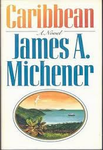
|
| Michener, James - Caribbean
|
(Random House US 1989 HC/DJ 80:-)
In this acclaimed classic novel, James A. Michener sweeps readers off to the Caribbean, bringing to life the eternal allure and tumultuous history of this glittering string of islands. From the 1310 conquest of the Arawaks by cannibals to the decline of the Mayan empire, from Columbus’s arrival to buccaneer Henry Morgan’s notorious reign, from the bloody slave revolt on Haiti to the rise of Cuba’s Fidel Castro, Caribbean packs seven hundred dramatic years into a tale teeming with revolution and romance, authentic characters and thunderous destinies. Through absorbing, magnificent prose, Michener captures the essence of the islands in all of their awe-inspiring scope and wonder.
|
|

|
| Michener, James A - Alaska
|
(Guild UK 1988 HC/DJ 80:-)
In this sweeping epic of the northernmost American frontier, James A. Michener guides us through Alaska’s fierce terrain and history, from the long-forgotten past to the bustling present. As his characters struggle for survival, Michener weaves together the exciting high points of Alaska’s story: its brutal origins; the American acquisition; the gold rush; the tremendous growth and exploitation of the salmon industry; the arduous construction of the Alcan Highway, undertaken to defend the territory during World War II. A spellbinding portrait of a human community fighting to establish its place in the world, Alaska traces a bold and majestic saga of the enduring spirit of a land and its people.
|
|

|
| Michener, James A - Alaska
|
(Random House US 1988 HC/DJ 125:-)
In this sweeping epic of the northernmost American frontier, James A. Michener guides us through Alaska’s fierce terrain and history, from the long-forgotten past to the bustling present. As his characters struggle for survival, Michener weaves together the exciting high points of Alaska’s story: its brutal origins; the American acquisition; the gold rush; the tremendous growth and exploitation of the salmon industry; the arduous construction of the Alcan Highway, undertaken to defend the territory during World War II. A spellbinding portrait of a human community fighting to establish its place in the world, Alaska traces a bold and majestic saga of the enduring spirit of a land and its people.
|
|

|
| Michener, James A - Space
|
(Random House US 1982 HC/DJ 80:-)
Already a renowned chronicler of the epic events of world history, James A. Michener tackles the most ambitious subject of his career: space, the last great frontier.
This astounding novel brings to life the dreams and daring of countless men and women—people like Stanley Mott, the engineer whose irrepressible drive for knowledge places him at the center of the American exploration effort; Norman Grant, the war hero and U.S. senator who takes his personal battle not only to a nation, but to the heavens; Dieter Kolff, Hitler’s rocket scientist, whose specialty is a rare commodity in this new era; Randy Claggett, the astronaut who meets his destiny on a mission to the far side of the moon; and Cynthia Rhee, the reporter whose determined crusade brings their story to a breathless world.
|
|

|
| Michener, James A - Texas
|
(Random House US 1985 HC/DJ 125:-)
Spanning four and a half centuries, James A. Michener’s monumental saga chronicles the epic history of Texas, from its Spanish roots in the age of the conquistadors to its current reputation as one of America’s most affluent, diverse, and provocative states.
Among his finely drawn cast of characters, emotional and political alliances are made and broken, as the loyalties established over the course of each turbulent age inevitably collapse under the weight of wealth and industry. With Michener as our guide, "Texas" is a tale of patriotism and statesmanship, growth and development, violence and betrayal — a stunning achievement by a literary master.
|
|

|
| Michener, James A - The Covenant
|
(Random House US 1980 HC/DJ 125:-)
James A. Michener’s masterly chronicle of South Africa is an epic tale of adventurers, scoundrels, and ministers, the best and worst of two continents who carve an empire out of a vast wilderness.
From the Java-born Van Doorn family tree springs two great branches: one nurtures lush vineyards, the other settles the interior to become the first Trekboers and Afrikaners. The Nxumalos, inhabitants of a peaceful village unchanged for centuries, unite warrior tribes into the powerful Zulu nation. And the wealthy Saltwoods are missionaries and settlers who join the masses to influence the wars and politics that ravage a nation. Rivalries and passions spill across the land of "The Covenant", a story of courage and heroism, love and loyalty, and cruelty and betrayal, as generations fight to forge a new world.
|
|

|
| Michener, James A - The Source
|
(Random House US 1965 HC/DJ 225:-)
In the grand storytelling style that is his signature, James Michener sweeps us back through time to the very beginnings of the Jewish faith, thousands of years ago.
Through the predecessors of four modern men and women, we experience the entire colorful history of the Jews, including the life of the early Hebrews and their persecutions, the impact of Christianity, the Crusades, and the Spanish Inquisition, all the way to the founding of present-day Israel and the Middle-East conflict.
|
|

|
| Montefiore, Simon - Sasjenka
|
(Norsteds Sweden 2009 HC/DJ 80:-)
Sankt Petersburg vintern 1916. Tsarryssland står vid randen till revolution. Sasjenka, just fyllda arton och elev vid Smolnyjinstitutet för adliga flickor, är på väg genom skolans grindar för att fira jullov då hon grips av tsarens polis. Hon har trots sin bakgrund, en stormrik judisk bankirfamilj, haft samröre med kretsar som vill störta tsarväldet. Sasjenka går under namnet "Kamrat Snöräv" och samma natt som hennes mor förlustar sig med Rasputin fryser hon själv i en stinkande cell. Äntligen ser hon det "verkliga" Ryssland. Hennes far, baron Zejtlin, lyckas efter ett dygn få henne fri. Då inleds hennes karriär som revolutionär på allvar. Hon kommer att tillhöra revolutionens frontfigurer och blir så småningom Lenins sekreterare.
Tjugo år senare, strax före andra världskrigets utbrott, är hon gift med en man vars stjärna står högt inom partiet. Men en passionerad kärlekshistoria kastar allt över ända, och under Stalins utrensningar i partitoppen faller skuggan snart över Sasjenka och hennes make.
Sasjenka ställs då inför ett fruktansvärt val - att tvingas offra sig själv för att om möjligt rädda det hon håller kärast, sina två barn.
|
|

|
| Numminen, M A - Tango är min Passion
|
(Schildts Sweden 1999 HC/DJ 175:-)
Virtanen bor i Helsingfors och är 35 år gammal. Han är tangofantast och dansar nästan varje kväll. Han är oerhört populär bland damerna, men följer stenhårt sin princip att inte ha sexuellt umgänge före 36 års ålder, en idé hämtad från Platon. En idé som får ödesdigra konsekvenser när han blir förälskad i Anja.
En roman om kärlek och dans, som också ger en inblick i tangons mysterier.
|
|
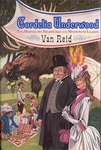
|
| Reid, Van - Cordelia Underwood
|
(Viking US 1999 HC/DJ 50:-)
Reid's rolicking followup to the sprawling historical comedy Cordelia Underwood returns to 1890s Portland, Maine, for the further exploits of Tobias Walton and his merry, bumbling do-gooders, the Moosepathians. Mollie Peer, a suffragette reporter, senses a good story when she impulsively follows a frightened street urchin called Bird to Portland's harbor. When he is claimed by menacing Mr. Pembleton, she realizes that Bird's life is in danger, and she enlists the help of baseball player Wyckford O'Hearn. Soon they are joined by the Moosepath League's Ephram, Eagleton and Thump, gallant and well-meaning (if less than keen) gentlemen who never shirk their duty, especially when women and children are concerned. First Edition
|
|

|
| Reid, Van - Daniel Plainway
|
(Viking US 2000 HC/DJ 50:-)
The rollicking adventures of Tobias Walton and the jovial Moosepath League continue in Reid's (Cordelia Underwood; Mollie Peer) engaging third novel set in 19th-century Maine. Reid ingeniously incorporates local color and history in a fast-moving tale that introduces the reader to dedicated attorney Daniel Plainway and the Dash-It-All Boys, three men who aspire to the camaraderie and renown of the Moosepath League. As the people of Portland prepare to celebrate the evolving rituals of Christmas, Walton and company become involved with Frederick and Isabelle Covington. The couple seek help from the League in searching for some mysterious runes, hoping they will prove that the Vikings preempted Columbus's discovery of the New World.
|
|

|
| Reid, Van - Mollie Peer
|
(Viking US 1999 HC/DJ 50:-)
Reid's rolicking followup to the sprawling historical comedy Cordelia Underwood returns to 1890s Portland, Maine, for the further exploits of Tobias Walton and his merry, bumbling do-gooders, the Moosepathians. Mollie Peer, a suffragette reporter, senses a good story when she impulsively follows a frightened street urchin called Bird to Portland's harbor. When he is claimed by menacing Mr. Pembleton, she realizes that Bird's life is in danger, and she enlists the help of baseball player Wyckford O'Hearn. Soon they are joined by the Moosepath League's Ephram, Eagleton and Thump, gallant and well-meaning (if less than keen) gentlemen who never shirk their duty, especially when women and children are concerned.
|
|
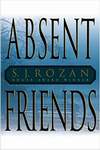
|
| Rozan, S J - Absent Friends
|
(Delacorte US 2004 HC/DJ 80:-)
Set in New York in the unforgettable aftermath of September 11, "Absent Friends" brilliantly captures a time and place unlike any other, as it winds through the wounded streets of New York and Staten Island...and into a maze of old crimes, damaged lives, and heartbreaking revelations. The result is not only an electrifying mystery and a riveting piece of storytelling but an elegiac novel that powerfully explores a world changed forever on a clear September morning.
In a novel that will catch you off guard at every turn, and one that is guaranteed to become a classic, S. J. Rozan masterfully ratchets up the tension one revelation at a time as she dares you to ponder the bonds of friendship, the meaning of truth, and the stuff of heroism.
|
|

|
| Sheed, Wilfrid - Boys of Winter
|
(Knopf US 1987 HC/DJ 60:-)
Jonathan Oglethorpe, a burnt-out editor at a distinguished New York publishing firm, lives year-round in the Hamptons, where he spends his evenings at Jimmy's Bar discussing sports and "summer people" with other New York expatriates. Oglethorpe is secretly incorporating these people into an elaborate roman a clefthat is, until he discovers that another Jimmy's regular is doing exactly the same thing. Each is a character in the other's book.
|
|

|
| Uris, Leon - Topaz
|
(McGraw Hill US 1967 HC/DJ 150:-)
On the eve of the Cuban Missile Crisis, American and French intelligence agents are plunged into a maze of Cold War intrigue In Paris, 1962, French intelligence chief André Devereaux and NATO intelligence chief Michael Nordstrom have uncovered Soviet plans to ship nuclear arms to Cuba. But when Devereaux reports his findings and nobody acts—and he is targeted in an assassination attempt—he soon realizes he’s tangled in a plot far greater than he first understood.
This copy has been signed by Leon Uris!
|
|

|
| Willard, Tom - Stone Ponies
|
(Tom Doherty US 2000 HC/DJ 80:-)
Tom Willard's Black Sabre Chronicles, telling the story of the Sharps family of military men and women from the Buffalo Soldier era of the Indian Wars to the present day, chronicles the effect of the controversial Vietnam War in The Stone Ponies.
Franklin LeBaron Sharps is a young paratrooper sent to Vietnam in 1965 with the celebrated 101(st) Airborne Division -- the "Screaming Eagles." The great-grandson of Sergeant Major Augustus Sharps and son of Brigadier General Samuel Sharps, a former Tuskeegee Airman, Franklin fights a war on two fronts: in Vietnam he is determined to repay the Viet Cong for their killing of his brother, and at home he fights against his father's attempts to reconcile with the family he deserted.
|
| | |
|
|
|
|


